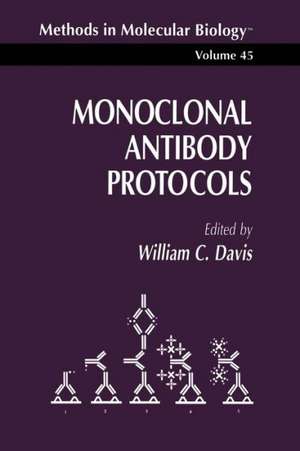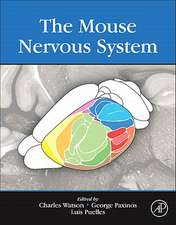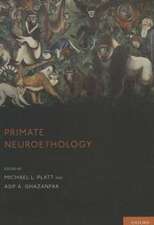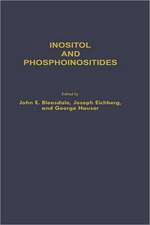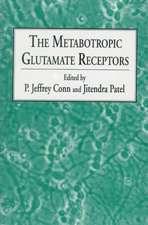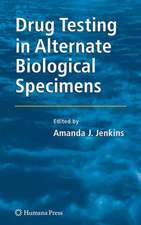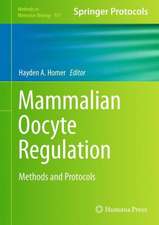Monoclonal Antibody Protocols: Methods in Molecular Biology, cartea 45
Autor William C. Davisen Limba Engleză Paperback – 23 mai 1995
Din seria Methods in Molecular Biology
- 9%
 Preț: 791.63 lei
Preț: 791.63 lei - 23%
 Preț: 598.58 lei
Preț: 598.58 lei - 20%
 Preț: 882.98 lei
Preț: 882.98 lei -
 Preț: 252.05 lei
Preț: 252.05 lei - 5%
 Preț: 802.70 lei
Preț: 802.70 lei - 5%
 Preț: 729.61 lei
Preț: 729.61 lei - 5%
 Preț: 731.43 lei
Preț: 731.43 lei - 5%
 Preț: 741.30 lei
Preț: 741.30 lei - 5%
 Preț: 747.16 lei
Preț: 747.16 lei - 15%
 Preț: 663.45 lei
Preț: 663.45 lei - 18%
 Preț: 1025.34 lei
Preț: 1025.34 lei - 5%
 Preț: 734.57 lei
Preț: 734.57 lei - 18%
 Preț: 914.20 lei
Preț: 914.20 lei - 15%
 Preț: 664.61 lei
Preț: 664.61 lei - 15%
 Preț: 654.12 lei
Preț: 654.12 lei - 18%
 Preț: 1414.74 lei
Preț: 1414.74 lei - 5%
 Preț: 742.60 lei
Preț: 742.60 lei - 20%
 Preț: 821.65 lei
Preț: 821.65 lei - 18%
 Preț: 972.30 lei
Preț: 972.30 lei - 15%
 Preț: 660.49 lei
Preț: 660.49 lei - 5%
 Preț: 738.41 lei
Preț: 738.41 lei - 18%
 Preț: 984.92 lei
Preț: 984.92 lei - 5%
 Preț: 733.29 lei
Preț: 733.29 lei -
 Preț: 392.60 lei
Preț: 392.60 lei - 5%
 Preț: 746.26 lei
Preț: 746.26 lei - 18%
 Preț: 962.66 lei
Preț: 962.66 lei - 23%
 Preț: 860.22 lei
Preț: 860.22 lei - 15%
 Preț: 652.64 lei
Preț: 652.64 lei - 5%
 Preț: 1055.50 lei
Preț: 1055.50 lei - 23%
 Preț: 883.87 lei
Preț: 883.87 lei - 19%
 Preț: 491.89 lei
Preț: 491.89 lei - 5%
 Preț: 1038.86 lei
Preț: 1038.86 lei - 5%
 Preț: 524.16 lei
Preț: 524.16 lei - 18%
 Preț: 2122.34 lei
Preț: 2122.34 lei - 5%
 Preț: 1299.23 lei
Preț: 1299.23 lei - 5%
 Preț: 1339.12 lei
Preț: 1339.12 lei - 18%
 Preț: 1390.26 lei
Preț: 1390.26 lei - 18%
 Preț: 1395.63 lei
Preț: 1395.63 lei - 18%
 Preț: 1129.65 lei
Preț: 1129.65 lei - 18%
 Preț: 1408.26 lei
Preț: 1408.26 lei - 18%
 Preț: 1124.92 lei
Preț: 1124.92 lei - 18%
 Preț: 966.27 lei
Preț: 966.27 lei - 5%
 Preț: 1299.99 lei
Preț: 1299.99 lei - 5%
 Preț: 1108.51 lei
Preț: 1108.51 lei - 5%
 Preț: 983.76 lei
Preț: 983.76 lei - 5%
 Preț: 728.16 lei
Preț: 728.16 lei - 18%
 Preț: 1118.62 lei
Preț: 1118.62 lei - 18%
 Preț: 955.25 lei
Preț: 955.25 lei - 5%
 Preț: 1035.62 lei
Preț: 1035.62 lei - 18%
 Preț: 1400.35 lei
Preț: 1400.35 lei
Preț: 716.65 lei
Preț vechi: 754.36 lei
-5% Nou
Puncte Express: 1075
Preț estimativ în valută:
137.15€ • 142.66$ • 113.22£
137.15€ • 142.66$ • 113.22£
Carte tipărită la comandă
Livrare economică 12-26 aprilie
Preluare comenzi: 021 569.72.76
Specificații
ISBN-13: 9780896033085
ISBN-10: 0896033082
Pagini: 264
Ilustrații: X, 264 p.
Dimensiuni: 155 x 235 x 22 mm
Greutate: 0.44 kg
Ediția:1995
Editura: Humana Press Inc.
Colecția Humana
Seria Methods in Molecular Biology
Locul publicării:Totowa, NJ, United States
ISBN-10: 0896033082
Pagini: 264
Ilustrații: X, 264 p.
Dimensiuni: 155 x 235 x 22 mm
Greutate: 0.44 kg
Ediția:1995
Editura: Humana Press Inc.
Colecția Humana
Seria Methods in Molecular Biology
Locul publicării:Totowa, NJ, United States
Public țintă
ResearchCuprins
Methods of Immunization to Enhance the Immune Response to Specific Antigens In Vivo in Preparation for Fusions Yielding Monoclonal Antibodies.- Methods of Immunization to Enhance the Immune Response to Specific Antigens In Vitro.- Culture Conditions that Optimize Outgrowth of Hybridomas.- Production of Stable Heterohybridomas Producing Human Monoclonal Antibodies.- Production of Stable Bovine-Murine Interspecies Hybrids.- Production of Monoclonal Antibodies in Swine.- Production of Monoclonal Antibodies in Horses.- Use of Electric-Field-Mediated Cell Fusion to Produce Hybridomas Secreting Monoclonal Antibodies.- Rapid Isotyping of Mouse Monoclonal Antibodies.- Methods of Measuring Antibodies in Sera/Plasma, Ascites, and Tissue-Culture Media.- Measurement of Immunoglobulin Synthesis Using the ELISPOT Assay.- Use of Monoclonal Antibodies in Immunohistochemistry.- Use of Monoclonal Antibodies in Immunoelectron Microscopy.- Use of Monoclonal Antibodies for Western Blotting with Enhanced Chemiluminescent Detection.- The Use of Directly and Indirectly Labeled Monoclonal Antibodies in Flow Cytometry.- Use of Monoclonal Antibodies and Flow Cytometry to Cluster and Analyze Leukocyte Differentiation Molecules.- In Vivo and In Vitro Production of Monoclonal Antibodies.- Separation of Monoclonal Antibodies from Cell-Culture Supernatants and Ascites Fluid Using Thiophilic Agarose.- Detection, Purification, and Utilization of Murine Monoclonal IgM Antibodies.- Preparation and Use of Immunoaffinity Columns with Monoclonal Antibodies Without Purification from Ascites and Tissue-Culture Medium.- Antigen Purification by Monoclonal Antibody Immunoaffinity Chromatography.- Coupling of Monoclonal Antibodies with Fluorophores.- Coupling of Monoclonal Antibodies with Biotin.- Coupling of Monoclonal Antibodies with Enzymes.- Use of Monoclonal Antibodies with Magnetic Particles to Separate Cell Subpopulations by Negative Selection.- Use of Monoclonal Antibodies with Magnetic Particles to Separate Cell Subpopulations by Positive Selection.
Recenzii
...written in sufficient detail that the first-time user could successfully use the protocols...a useful purchase... -Trends in Biochemical Sciences
